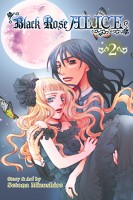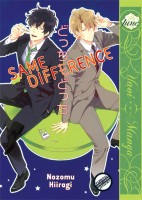My News and Reviews
Last week at Experiments in Manga the winner of the Sherlock Bones manga giveaway was announced. As usual, I took the opportunity to compile a list of manga as well, in this case a list of manga available in English that feature detectives or other crime solvers. I also posted two reviews last week. The first review was of No. 6, Volume 9, the final volume of Hinoki Kino’s No. 6 manga adaptation. I’m happy to report that the manga has a much less rushed and much more complete ending than the anime adaptation had. And for something completely different, I also reviewed Ivan Morris’ translation of The Pillow Book of Sei Shōnagon last week. It may have been written in the tenth and eleventh centuries, but it’s still an engaging and enjoyable work.
Interesting reading found elsewhere online included a look at some of the most completely collected manga series in Japan, many of which have been licensed in English in whole or in part. (I was happy to see some of my personal favorites, like Parasyte and Hikaru no Go on the list.) Brigid Alverson has a nice overview of the current state of the manga industry in North America for School Library Journal. And over at A Case for Suitable for Treatment, Sean Gaffney has a roundup of some of the recent manga licenses from various publishers. There are also two surveys that are going on right now. Viz has its Fall 2014 Anime and Manga Survey and Vertical has its first ever light novel survey. Last but not least, Khursten Santos of Otaku Champloo has an excellent writeup of the Manga Futures conference recently held in Australia.
Quick Takes
 Black Jack, Volumes 14-17 by Osamu Tezuka. It’s a shame that much of Black Jack has gone out of print. Fortunately, Vertical announced just last week that it will be publishing ebooks of all its Tezuka manga, so readers who missed Black Jack in print will at least be able to read it digitally. Even though Black Jack isn’t my favorite Tezuka manga, I enjoy the series immensely and Black Jack is one of my favorite Tezuka characters. He can be a bit of a bastard, but there’s usually a reason for it and it tends to mostly be a cover for his extraordinary compassion. He’s also amazingly skilled. Some of the stories in Black Jack are fairly improbable although still highly entertaining while others are actually quite realistic. (Tezuka’s medical training comes in very handy for Black Jack.) Plastic surgery, specifically surgeries that are intended to change or hide a person’s identity, are particularly prominent in these final volumes. It provides an interesting contrast to Black Jack himself who rarely denies who he is. The seventeenth volume in Vertical’s edition of Black Jack also includes a handy guide to the publication history of the individual chapters.
Black Jack, Volumes 14-17 by Osamu Tezuka. It’s a shame that much of Black Jack has gone out of print. Fortunately, Vertical announced just last week that it will be publishing ebooks of all its Tezuka manga, so readers who missed Black Jack in print will at least be able to read it digitally. Even though Black Jack isn’t my favorite Tezuka manga, I enjoy the series immensely and Black Jack is one of my favorite Tezuka characters. He can be a bit of a bastard, but there’s usually a reason for it and it tends to mostly be a cover for his extraordinary compassion. He’s also amazingly skilled. Some of the stories in Black Jack are fairly improbable although still highly entertaining while others are actually quite realistic. (Tezuka’s medical training comes in very handy for Black Jack.) Plastic surgery, specifically surgeries that are intended to change or hide a person’s identity, are particularly prominent in these final volumes. It provides an interesting contrast to Black Jack himself who rarely denies who he is. The seventeenth volume in Vertical’s edition of Black Jack also includes a handy guide to the publication history of the individual chapters.
 Black Rose Alice, Volume 2 by Setona Mizushiro. I absolutely loved the first volume of Black Rose Alice and I remained captivated by the second. It’s a strange, dark, and disconcerting series. Mizushiro’s vampires are completely different from any other type of vampire that I’ve come across in fiction. I do like that, but it’s also challenging since readers can’t rely on an already established mythos or assume what it actually means to be a vampire; Mizushiro has to explain it all. I’m not sure that I actually understand everything that is going on with the vampires yet, but I’m assuming that more will be revealed as the series progresses. One thing is certain, though: they are definitely very creepy. In exchange for the life of the young man with whom she is in love, Azusa has entered into an agreement with a nest of vampires. Out of the four vampires, she must choose one to procreate with after which they will both die. The relationship dynamics are bizarre, and honestly a little discomforting, but very compelling as the vampires vie for her affections. It’s not as simple as choosing one of the vampires; in order to fulfill her agreement, she will actually have to come to love them. I’m really looking forward to reading more of Black Rose Alice.
Black Rose Alice, Volume 2 by Setona Mizushiro. I absolutely loved the first volume of Black Rose Alice and I remained captivated by the second. It’s a strange, dark, and disconcerting series. Mizushiro’s vampires are completely different from any other type of vampire that I’ve come across in fiction. I do like that, but it’s also challenging since readers can’t rely on an already established mythos or assume what it actually means to be a vampire; Mizushiro has to explain it all. I’m not sure that I actually understand everything that is going on with the vampires yet, but I’m assuming that more will be revealed as the series progresses. One thing is certain, though: they are definitely very creepy. In exchange for the life of the young man with whom she is in love, Azusa has entered into an agreement with a nest of vampires. Out of the four vampires, she must choose one to procreate with after which they will both die. The relationship dynamics are bizarre, and honestly a little discomforting, but very compelling as the vampires vie for her affections. It’s not as simple as choosing one of the vampires; in order to fulfill her agreement, she will actually have to come to love them. I’m really looking forward to reading more of Black Rose Alice.
 Same Difference by Nozomu Hiiragi. Tsuburaya and Ozaki are the elite of the elite, and both adored by the women at the company where they work. (So much so that the ladies literally swoon in their presence.) However, Ozaki isn’t used to sharing the attention, and so decides to make Tsuburaya fall in love with him, unintentionally falling for Tsuburaya in the process. Out of the two of them, Ozaki is more muscular and crude while Tsuburaya is more elegant and refined. Despite arguably being the more masculine and aggressive of the pair, Ozaki is often the one being out-maneuvered by Tsuburaya in their seemingly antagonistic relationship. It’s not that Tsuburaya dislikes Ozaki—quite the opposite, actually—it’s just that he has a sadistic streak and enjoys making the other man squirm. Same Difference is definitely played for laughs more than romance. Apparently the manga is actually an ongoing series that’s currently up to three volumes in Japan, which I hadn’t realized while reading it. Unfortunately, only the first volume has been licensed in English at this point. Honestly, I wouldn’t mind reading more of the series. It doesn’t have the most subtle, nuanced, or realistic characters or story, but it’s amusingly ridiculous and doesn’t take itself seriously at all.
Same Difference by Nozomu Hiiragi. Tsuburaya and Ozaki are the elite of the elite, and both adored by the women at the company where they work. (So much so that the ladies literally swoon in their presence.) However, Ozaki isn’t used to sharing the attention, and so decides to make Tsuburaya fall in love with him, unintentionally falling for Tsuburaya in the process. Out of the two of them, Ozaki is more muscular and crude while Tsuburaya is more elegant and refined. Despite arguably being the more masculine and aggressive of the pair, Ozaki is often the one being out-maneuvered by Tsuburaya in their seemingly antagonistic relationship. It’s not that Tsuburaya dislikes Ozaki—quite the opposite, actually—it’s just that he has a sadistic streak and enjoys making the other man squirm. Same Difference is definitely played for laughs more than romance. Apparently the manga is actually an ongoing series that’s currently up to three volumes in Japan, which I hadn’t realized while reading it. Unfortunately, only the first volume has been licensed in English at this point. Honestly, I wouldn’t mind reading more of the series. It doesn’t have the most subtle, nuanced, or realistic characters or story, but it’s amusingly ridiculous and doesn’t take itself seriously at all.
